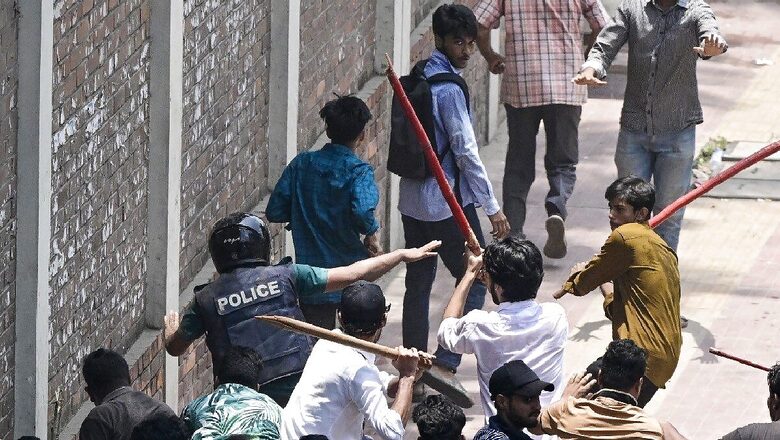
views
Students in Bangladesh rejected an olive branch from Prime Minister Sheikh Hasina on Thursday and pressed on with nationwide protests against civil service hiring rules.
At least thirty-nine have died in the protests that demand reforms in the quota rules.
The protesters are demanding the abolition of a quota system that reserves up to 30 per cent of government jobs for relatives of veterans who fought in Bangladesh’s 1971 war of independence.
The protests are being led by Students Against Discrimination, a coalition of student unions barring the Bangladesh Chhatra League (BSL) – the youth wing of Hasina’s Awami League.
On Thursday, riot police fired tear gas and rubber bullets to disperse crowds of protesters and several metro stations in Dhaka city were shuttered. The protesting students claim that BSL and policemen have attacked the protesters.
Internet and Mobile Services Cut Off
Ekattor TV, a Bangladeshi news channel, said that working-class people in Bangladesh are facing issues with their daily life due to roadblocks and internet shutdowns. The government ordered the shutdown of mobile internet networks to quell demonstrations earlier this week.
The agitators have called for a ‘complete shutdown programme’ which had led to ‘a public transport crisis in the capital’, BD24, a Bangladeshi news outlet, said.
Cars and the reception area of the state-run Bangladesh Television building in Dhaka’s Rampura have been set on fire during the ongoing shutdown called by quota reform protesters.
Hasina, according to a separate report by BD24 said that Bangladesh law minister Anisul Haque and education minister Mahibul Hasan Chowdhury have been deployed by Hasina to speak to the agitators.
Asif Mahmud, one of the coordinators of the protests, according to Ekattor TV, which cited his Facebook post, said that “there is no dialogue with bullets”.
“It did not reflect the murders and mayhem carried out by her party activists,” he told news agency AFP, reacting to the government’s outreach and Hasina’s pledge to bring to justice those responsible for the death of students.
Protests are still ongoing in Dhaka’s Badda, Dhanmondi, Jatrabari, Mirpur, ECB Chatwar, Uttara and adjoining areas. Ekattor TV said that police officers and agitators have clashed in some of these areas whereas in some places police were chasing agitators.
Clashes were also reported from Chapainawabganj, Jessore, Comilla and Magura and Chattogram.
Bangladesh has also shut schools and colleges nationwide.
“At the Brac University medical centre at least 25 students were treated for rubber bullet wounds and tear gas-related injuries. Rubber bullets hit several students in their eyes,” a university official told AFP.
But Why Are Students Protesting
The demonstrations started last month after the High Court reinstated a quota system for government jobs, overturning a 2018 decision by Prime Minister Sheikh Hasina’s government to scrap it, according to a report by news agency Reuters.
Bangladesh has more than 1.9 million civil servant posts, according to a 2022 report by the country’s public administration ministry.
More than half of the people hired to these jobs are not selected on merit but under affirmative action rules prioritising women, residents of less developed districts and other disadvantaged cohorts.
The most contentious aspect of this quota system is the reservation of 30 percent of posts for children of freedom fighters who fought in the country’s 1971 liberation war against Pakistan.
The current rules were introduced in 1972 by independence leader Sheikh Mujibur Rahman, father of current Prime Minister Sheikh Hasina.
Earlier protests by students in 2018 prompted Hasina’s administration to cut down the quota scheme.
Civil service posts offer a chance at stable lifetime employment but students say the quota system is abused to stuff government posts with loyalists of Hasina’s ruling Awami League party.
They want the quota system dramatically scaled back to only apply to ethnic minorities and people with disabilities, with the remaining 94 percent of positions selected purely on merit.
The Supreme Court suspended the high court order after the government’s appeal, setting a date of August 7 to hear the government’s challenge. The apex court had suspended the quota system on July 10 for one month and called on demonstrators to return to classes.
However, protests have continued nearly every day since July 1 with university pupils blocking major roads and railway lines in big cities to draw attention to their demands.
Students, according to news agency Reuters are reportedly angered because Hasina has also labelled them as “razakar”, making use of a term for those accused of collaborating with Pakistan’s army in 1971 to betray the country.
Bangladesh’s Economy
The protests have also been spurred due to high youth unemployment, as nearly 32 million young people are out of work or education from a population of 170 million.
Bangladesh was one of the world’s poorest countries when it gained independence in 1971 and suffered a devastating famine three years later.
Its economy has grown dramatically in the decades since, thanks largely to a thriving textile industry that supplies the world’s leading fast fashion brands and accounts for around $50 billion in yearly exports.
But the country still struggles to provide adequate employment opportunities for its burgeoning population of about 170 million people.
More than 40 percent of Bangladeshis aged between 15 and 24 were not working, studying or training, according to government statistics from 2022 — altogether 18 million people.
And stagnant job growth in the private sector makes public sector jobs, with their accompanying regular wage hikes and privileges, very attractive.




















Comments
0 comment